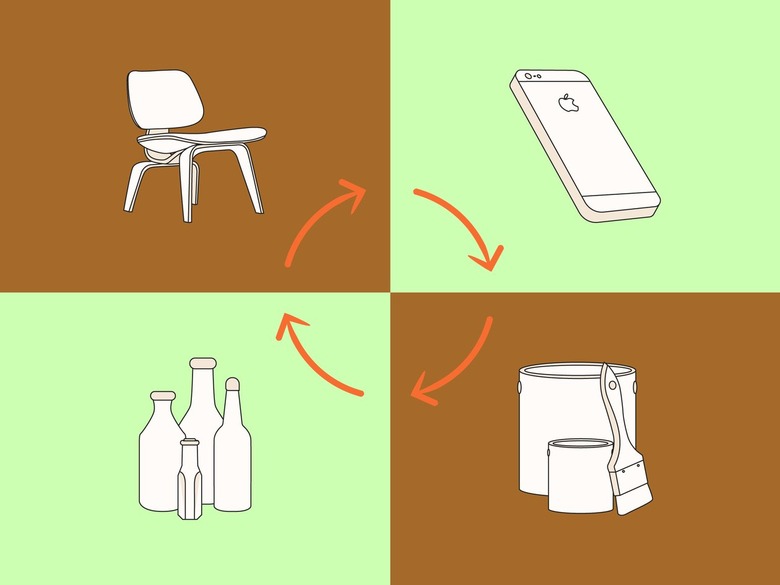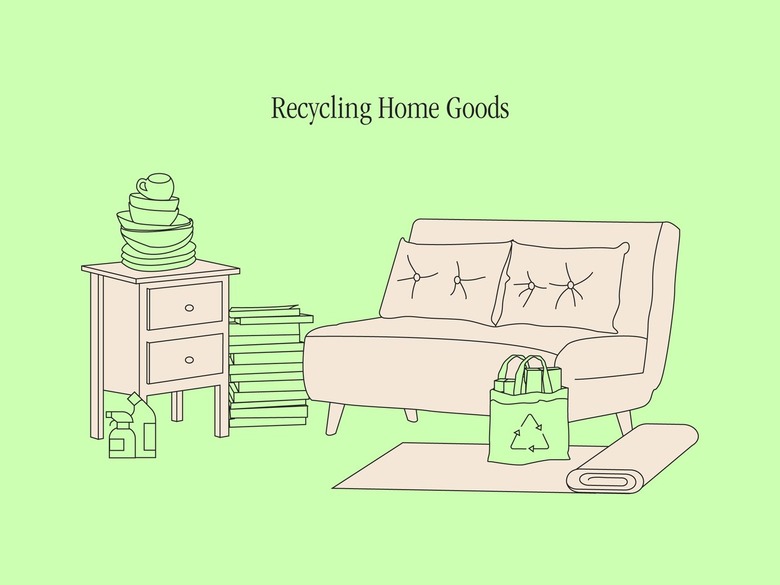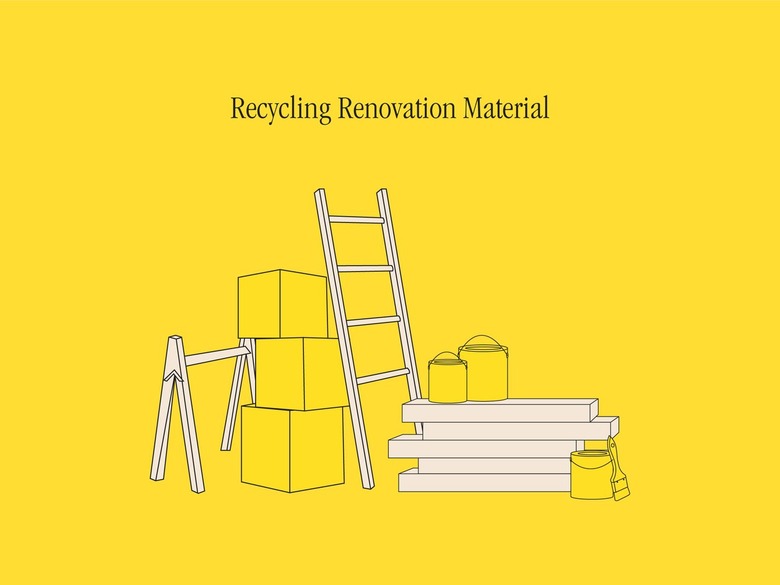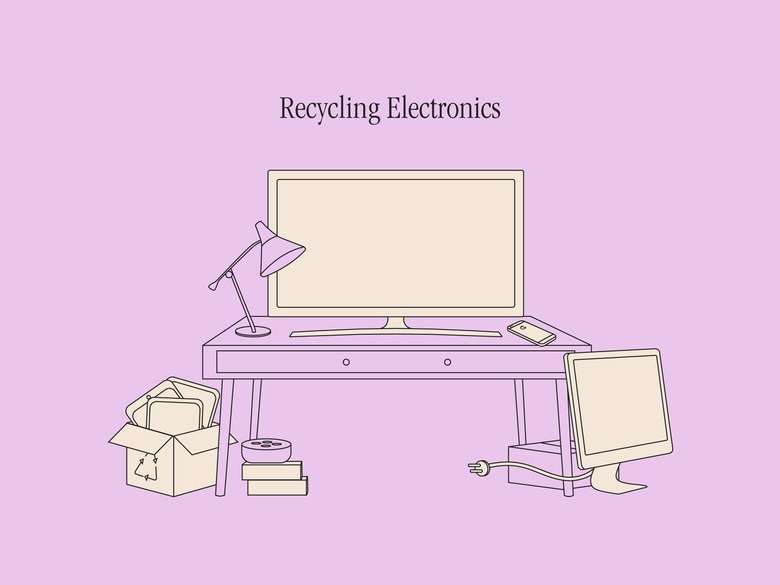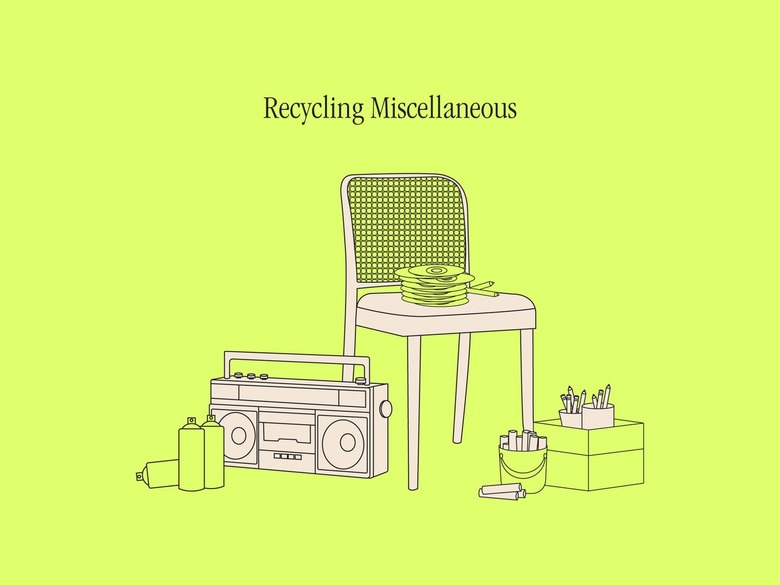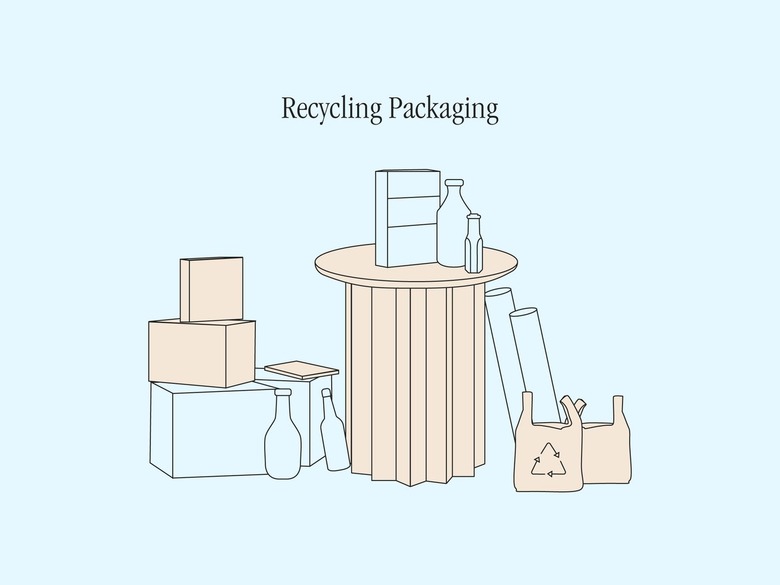How To Recycle (Absolutely) Everything In Your House
- What is recycling?
- Why should we recycle?
- Avoid 'wishcycling'
- Appliances
- Light bulbs
- Rugs and carpets
- Ceramic dishes
- Pots and pans
- Cloth napkins
- Shower curtains
- Books and magazines
- Curtains
- Mattresses
- Box springs
- Bed linens
- Pillows
- Furniture
- Sponges and scrubbers
- Renovation materials
- Wood
- Concrete
- Paint and stain
- Electronics
- Batteries
- Aerosol cans
- CDs and DVDs
- Packaging
- Bottles and containers
- Paperboard
- Aluminum cans
- Cardboard boxes
- Styrofoam and EPS foam
- Film plastic
- Aluminum foil
- Mail and envelopes
While reducing the amount of products you purchase is likely the best way to lower your personal environmental impact, recycling the ones you can is a close second. Recycling keeps things out of the landfill and gives them a second life, minimizing waste that can release harmful chemicals and pose a threat to wildlife and humans while sitting in a landfill (or in the ditch).
But we've all been there: We have an item we're cleaning out of the closet or the garage, and have absolutely no idea what to do with it. If you're confused about where or how to recycle the items in your house, our guide has all the answers you're looking for.
What is Recycling?
What is Recycling?
Recycling is the process of converting waste materials into new materials.The idea is to take used materials, like paper, plastic, glass, and metal, and process them to make new products. This gives the material a second life while reducing the amount of waste in landfills and cutting down on the use of raw materials for manufacturing.
Why Should We Recycle?
Why Should We Recycle?
Most of the garbage you've taken out to the curb is still sitting somewhere on the planet. As these materials sit in the landfill, they release harmful chemicals into the environment, negatively impacting air and water quality and posing threats to local ecosystems, including humans and wildlife.
Not to mention, some garbage can end up in the environment — maybe the wind blew it out of your garbage can or it fell out of the garbage truck. Those loose items directly pollute the physical environment and can harm wildlife.
Recycling your waste instead of just throwing it in the trash is a great way to live an eco-friendly lifestyle.
Avoid 'Wishcycling'
Avoid 'Wishcycling'
Recycling your unwanted items seems like a no-brainer, but it's not that easy. Some things need to be cleaned and dried before recycling, while others must be taken to special recycling facilities.
Lynn Knapp, senior consultant at Cascadia, a Seattle-based environmental consulting firm, tells Hunker that while a lot of people want to recycle as much as possible, that's not always the best environmental decision.
She says "wishcycling" (tossing something in the bin that you're not actually sure is recyclable and hoping for the best) actually has negative impacts on the whole recycling system. "We are getting a lot of materials that should be in the trash that contaminate the recycling bales, decrease the value of the bales, and end up in the landfill anyway," she says.
Knapp says some of the most common wishcycled items in Seattle are things too small to be recycled (like bottle caps), items made from mixed materials (a Pringles can, for example, which has a metal bottom and cardboard sides), plastic bags, and rubber gloves.
Here are some quick recycling tips to keep in mind to avoid this common recycling faux pas:
- Contact your local recycling facility to get the details on what they do and don't accept before you recycle anything.
- Follow your city's recycling guidelines if you participate in a municipal recycling program. For example, some cities require you to separate your recyclables into categories (like cardboard, plastic, and aluminum), while others ask you to include everything in the same bin.
- Rinse your recyclables briefly to make sure they don't have any chemical or food residue on them — this can jam up the machinery in the recycling facility.
Home Goods
Home Goods
Appliances
Appliances
Appliances have a finite shelf life — or they get ditched in favor of a newer, cleaner model. Luckily, you can donate or give away old appliances that are in working condition. Donation centers for nonprofits like Goodwill or the Salvation Army will be happy to take your old working appliance off your hands. Otherwise, give it to a local nonprofit organization that you love to support.
If your appliance is broken, you may be able to recycle it with an electronics recycler. Call your local waste management company to learn where you can take it. These items are generally not accepted by curbside pickup recycling services, but you may be able to hire a junk hauler or recycler to pick it up for you if needed. Junk removal professionals will do what they can to recycle or donate the appliance, but if it's broken, they'll probably have to bring it to a landfill.
Light bulbs
Light bulbs
The right way to dispose of light bulbs will vary depending on what type of bulb it is. CFL, LED, halogen, and incandescent bulbs are all disposed of differently because they're made from different materials.
- CFL bulbs: These bulbs contain trace amounts of mercury, a hazardous chemical, so they must be disposed of with other household hazardous waste (like old paint) and handled with care. Some retailers, like Home Depot, have CFL recycling programs. Check with your municipality for current regulations and further guidance on where to dispose of yours.
- LED bulbs: These are also recyclable. Some cities have their own recycling program dedicated to LED bulbs — ask your local public works department if an LED bulb recycling program exists near you. If so, you may be able to set your old ones out for curbside recycling pickup. If there isn't an LED light bulb recycling program in your area, don't resort to throwing them away. Various retailers have programs to recycle LED bulbs, including IKEA and Batteries Plus.
- Incandescent and halogen bulbs: Unfortunately, these types of light bulbs aren't recyclable. They can be thrown away in your household trash, however as they don't contain mercury.
Rugs and carpets
Rugs and carpets
Rugs and carpets are difficult to recycle because they're made up of multiple components that can be extremely challenging to separate. But with the right equipment, it can be done. To recycle your old rugs and carpets, you'll need to find a specialty recycler (Carpet America Recovery Effort, or CARE, has a map of carpet collection sites to assist you in this task).
If you had your heart set on recycling carpets or rugs through your city's program, keep in mind that most municipalities won't take rugs or carpets curbside. Your best bet is to call your city waste management center to see if they have drop-off sites or specific household waste collection days scheduled throughout the year.
Ceramic dishes
Ceramic dishes
Ceramics are fully recyclable, but many recyclers won't accept them because they don't have the infrastructure needed to break down ceramics. Some recycling facilities that take similar items, like bricks, will take your old ceramic dishes, but you need to give them a call or check their website to learn more about what items they accept.
If your ceramic item in question is in good condition, you could always donate it to a nonprofit like Goodwill or Salvation Army (although ensure your item isn't damaged or chipped because ceramic cookware can be dangerous to cook with) . If the piece is broken, you could give it a second life by making a craft project like a mosaic table or mirror.
Pots and pans
Pots and pans
Recycling your used pots and pans is advised, but you typically can't just toss them in your curbside recycling bin. Those made from copper, aluminum, or stainless steel are generally recyclable at a scrap metal recycling facility (to find one search for the particular type of metal and your zip code on Earth 911's tool), but nonstick cookware isn't.
Because nonstick cookware is coated with a plastic material, it's extremely difficult to recycle at a facility. Luckily, there are retailers that have mail-in recycling programs — like Made In, which will accept nonstick pans from any company to recycle through a Habitat for Humanity Restore partnership.
And of course, if the pot or pan is in good condition, you can always donate it to a nonprofit center like Goodwill or Salvation Army.
Cloth napkins
Cloth napkins
Although you likely can't toss them in your household recycling bin, cloth napkins (and other textiles) are completely recyclable. Textiles that are in usable condition are great candidates for donation — either drop them off at a donation center or give them to your favorite local nonprofit.
But if your cloth napkins are tattered or stained, recycling at a specialized textile recycling facility is an option (to find these, search for "textile recycler near me" or try the American Textile Recycling Service). Some municipalities also have textile recycling programs, but you'll need to verify online or call ahead before you drop off.
Shower curtains
Shower curtains
When you're upgrading to a new shower curtain, you might be wondering what to do with the old one, and that depends on whether it is made from cloth or plastic. Cloth shower curtains can be treated like other textiles: Donate it if it's in good condition or recycle it with a textile recycler near you. Unfortunately finding a textile recycling center can be a bit difficult, so you'll have to do some searching online to see if your municipality has a textile program or if there's a specialty recycler near you. To find these, search for "textile recycler near me" or try the American Textile Recycling Service for drop-off site locations.
Plastic shower curtains (typically made from PVC) are not recyclable, but you can repurpose them and use them as drop cloths or table covers while you tackle messy DIY projects.
Books and magazines
Books and magazines
Unless your books and magazines are wet or brown, they are recyclable. Toss your unwanted magazines in the recycling bin with the rest of your mixed paper — same with paperback books. Magazines and paperbacks are 100% made of paper. Hardcovers, on the other hand, require some prep before tossing them in the bin. Remove the hard covers before recycling your books (they typically contain non-paper materials) and recycle the rest. You'll have to throw the hardcover away in the garbage.
Of course, you could also always donate books to a nonprofit donation center to give them a second life.
Curtains
Curtains
Treat old fabric curtains like you would any other textile. You can recycle them at certain facilities that have special equipment to recycle fabric. To find these, search for "textile recycler near me" or try the American Textile Recycling Service for drop-off site locations. Keep in mind that you'll also need to remove any grommets or hardware before recycling (ask the local textile recycler near you about prep).
You can also always drop curtains off at donation centers like Goodwill or Salvation Army if they're in good condition.
Mattresses
Mattresses
Although mattresses are big, bulky, and made up of a lot of different materials, they are recyclable. That said, it can be a challenge to find a recycler who is willing to deal with the disposal of a single mattress.
It's likely easiest to go through a retailer to recycle your mattress. If you're purchasing a new mattress, ask them if they can haul away and recycle your old one. (And actually, in California, this is the law.) You can also search for a mattress recycler near you (this guide from bye bye mattress has a comprehensive list).
Stores like Goodwill and The Salvation Army may also be able to haul away and dispose of your mattress for you if the item is in good condition.
Box springs
Box springs
Box springs are made up of easily recyclable materials, including wood, steel, and cotton. Generally anywhere you can recycle a mattress, you can recycle a box spring. So, if you're purchasing a new one, ask if they can pick up your old box springs and/or check with your local donation center to see if they will take it. However, like mattresses, it can be tricky to coordinate the recycling.
Blankets, sheets, and other bed linens
Blankets, sheets, and other bed linens
When it's time to replace your bedding (and other textiles, like towels), consider donating them as long as they're in good condition. Churches, animal shelters, and other nonprofits will gladly take them. But if your blankets and sheets aren't in good shape, you can recycle them with a textile recycler.
Pillows
Pillows
A vast majority of recycling programs will not accept pillows for curbside recycling, and because pillows can harbor so many germs, many donation centers won't take them (like Goodwill).
However, if you are determined to recycle this item, you may be able to recycle your old pillows through a textile recycler. It should be noted up front that most textile recyclers require that pillows be free from grease, blood, or oil stains.
Couches, chairs, and other furniture
Couches, chairs, and other furniture
If you're looking to get rid of some furniture, your very best bet is to drop it off at a donation center that accepts large pieces, or list it online in a marketplace like Facebook, Craigslist, or a Buy Nothing group — because actually recycling furniture is difficult and not usually feasible. Not only is furniture made up of a variety of different materials (cotton, wood, metal, etc.), but it's also bulky and difficult to handle.
However, furniture that is mostly made up of metal, like patio furniture, may be taken to a scrap metal recycling center. If for some reason you are unable to sell or donate your patio furniture, you can contact a scrap metal yard near you to see if they can pick it up. (Bonus: You can potentially make a bit of cash on this transaction.)
You could also take a good look at your furniture to see if you could paint it, stain it, or upcycle it in in some way (like this fun dresser rehab) to give it a second life in your home.
Sponges and scrubbers
Sponges and scrubbers
Kitchen sponges and scrubbers are typically made from tiny bits of plastic, and they're very difficult to recycle. Unlike many other plastic goods, you can't toss them into the bin for your regular curbside recycling pickup. TerraCycle, a mail-in recycler, currently only has one program that accepts these SKURA Style Sponges. If your sponges don't fall into this category, you'll unfortunately have to send them to a landfill.
Tip
To avoid putting more sponges in landfills, find alternative ways to clean dishes and your countertops, like an eco-friendly Swedish dish cloth or compostable sponges.
Warning
Wrap broken glass (like from windows, mirrors, or bottles) in thick paper, like newspaper, before disposing of it. Most curbside pickup recycling services won't accept broken glass for safety reasons, so your best bet might be just to toss it in your household trash or dumpster.
Renovation Materials
Renovation Materials
Wood
Wood
As long as it's not painted or pressure-treated, wood is recyclable. But how to actually recycle it depends on your community and the recycling programs your municipality has. (In New York City, for example, you can set wood out with curbside recycling.) But in most municipalities, your best bet is to find a wood waste recycler by searching for "wood waste recycler near me" or "wood recycling near me."
Tip
If you find yourself with untreated scrap wood leftover from a DIY project or renovation, you can compost it. Grind it into sawdust or cut it into small pieces and set it in your compost bin.
Concrete
Concrete
How you recycle your unwanted concrete ultimately depends on the size and type of concrete you're working with. If it's a large amount (think a patio or a countertop), you will likely need to find a company who can transport the material to a recycling facility for you. If you're working with a small amount (like pavers), you may be able to transport it to a specialty construction waste recycler yourself. The best way to find the right company is to use Earth 911's search tool to find specialty building material recyclers who accept concrete.
Paint and stain
Paint and stain
Oil-based stain and paint is not recyclable and you'll need to treat it like household hazardous waste. This means either dropping it during a hazardous waste collection day in your city or searching for "hazardous waste location near me." If you don't have a hazardous waste collection center in your city, simply put kitty litter in the paint can, wait for it to dry out a bit, and throw away in your garbage.
However, recycling is possible for water-based stain and paint products, depending on what programs are available in your area. — although it is challenging. Your best bet is to take it to Habitat for Humanity Re-Store, which offers waste drop-off sites for recycling old paint and stain. (Note that depending on your location they may have specific drop-off days for paint and they may not accept it altogether.) More drop-off sites are available through Earth 911's search tool. Simply type in "paint" and your zip code to see what locations are available.
Electronics
Electronics
From TVs to cell phones, electronic devices are, contrary to popular belief, recyclable. In fact, many of the materials in electronic devices are quite valuable. Once you've erased your personal information, take your electronics to a nonprofit donation center if it's in good working condition. It's also likely that your local community hosts an electronics recycling program, so watch for those dates (typically on weekends in spring).
Another simple way to get rid of old electronics is to drop it off or mail it into retailers that have an electronics recycling program. Some stores that will recycle your old electronics are:
Miscellaneous
Miscellaneous
Batteries
Batteries
Single-use alkaline and zinc-carbon batteries (common everyday batteries that include 9 Volt, AA, AAA, C, D, and some button cell batteries) are recyclable. However, it's unlikely you can just toss them in your recycling bin for curbside pickup as most municipalities don't currently accept batteries.
So, how do you recycle them?
- Home Depot accepts rechargeable (and sometimes single-use depending on your location) batteries.
- There are also battery recycling drop-off locations around the country, which are easily located through Call2Recycle's handy tool.
- Try a mail-in program like Call2Recycle offers. Though it's a cost (about $55 at time of publication), the recycling kit can hold up to 25 pounds of batteries and cell phones so you can recycle a bunch at once.
Tip
Before you recycle your batteries, check your state's current regulations. Laws regarding battery disposal vary greatly and are constantly evolving.
Aerosol cans
Aerosol cans
Generally speaking, aerosol cans are recyclable, though it can vary from city to city whether or not you can put it in your recycling bin. Before you toss it in with your other recyclables, check with your local waste management company to determine how to dispose of your empty aerosol cans. It's important to keep in mind that if your aerosol cans are full or partially full, they are not recyclable no matter what, so be sure to empty it out.
If your municipality doesn't accept aerosol cans for curbside pickup, find a recycling center near you that accepts them. An easy tool to use is Earth 911's Recycling Locater.
Warning
Do not try to alter or puncture the aerosol can in any way, as it can potentially be explosive depending on its contents.
CDs and DVDs
CDs and DVDs
Unless your car has a built-in CD player, you probably have no use for them. Unfortunately, it can be quite difficult to recycle CDs and DVDs since there's not much of a market for the thin plastic they are made from, so recycling options are limited.
Your best option is to give them new life by taking them to a donation center or a record store. If you're absolutely determined to recycle them, however, there is a company called Greendisk, which recycles "technotrash" (aka all the obsolete accessories we used to use like CD-roms, floppy discs, old cell phones, etc.). This comes at a cost, of course, and packages start at around $60.
Packaging
Packaging
Bottles and containers
Bottles and containers
Most plastic, glass, and aluminum bottles and containers can be recycled, but the key thing to remember is that you'll need to empty and rinse them out first. You can toss these containers into the bin with the rest of your recyclables for curbside pickup, but make sure to check the guidelines for your program specifically to make sure the material you're tossing in the bin is accepted.
Upcycling empty bottles is another great option — try upcycling your salsa jars into pantry storage.
Tip
Plastic bottles and containers have a number etched into the bottom of them, which notes the type of plastic they're made from. For example, milk jugs are typically made from number 2 plastic, while water bottles are typically made from number 1 plastic. Your local recycling program will have guidelines on what types of plastic they accept, so check there before tossing yours in the bin.
Paperboard
Paperboard
The boxes holding your cereal, granola bars, and other snacks are made from paperboard. While paperboard is thicker than normal paper, it's thinner than cardboard because it's made up of only one layer (cardboard is typically three layers). You can recycle your paperboard with the rest of your paper products, which means you can simply toss it in your bin or deliver it to a recycling facility near you.
Aluminum cans
Aluminum cans
Aluminum is completely recyclable. In fact, Knapp tells Hunker that aluminum cans are one of the highest value recyclable items.
Generally, you can toss the cans in with the rest of your recyclables for curbside pickup, unless your municipality does not have an aluminum recycling program in place (or if you don't have a recycling program in your community). In that case, you'll have to find a drop-off location near you. The easiest way to do this is to search "recycling facility near me."
Cardboard boxes
Cardboard boxes
Cardboard is recyclable — and lucky for you it's one of the easiest items to get rid of. Most municipalities accept cardboard for curbside recycling pickup, but they usually ask you to break down the boxes first so that they take up less room in the recycling truck.
Tip
You can't recycle cardboard contaminated with chemicals or food waste, like greasy pizza boxes. Throw chemical-laden cardboard away and compost cardboard with food waste on it if possible.
Styrofoam and EPS foam
Styrofoam and EPS foam
There's just no getting around it. Styrofoam (or EPS foam, as it's technically referred to) is difficult to recycle quite simply because it's not cheap for recyclers to do — but that doesn't mean you should give up. Styrofoam and EPS foam products are more easily recyclable in some states, like California, but the process requires special equipment and the fact of the matter is that not every recycling center will accept the materials.
If you're determined to recycle your EPS foam products like egg cartons, packing peanuts, or packaging around electronics, the easiest way to do so is to search online for drop-off sites or mail-in programs, many of which are listed on the EPS Industry Alliance map.
Plastic wrap, grocery bags, and other film plastic
Plastic wrap, grocery bags, and other film plastic
Unfortunately, you can't set film plastic out with the rest of your recyclables for pickup. Because it's made up of multiple different materials, film plastic (think plastic grocery bags or the thin plastic wrapping your pack of paper towels), it requires special machinery to be recycled.
But, this doesn't mean it can't be recycled. Your best bet is to take any bags to a local grocery retailer that has recycling bins specifically for film plastics, including Target, Walmart, Kroger, and even Kohl's. If you're unsure of where to take your plastic grocery bags, Bag and Film Recycling has a handy tool to help you locate drop-off centers.
Aluminum foil
Aluminum foil
Aluminum is 100% recyclable, but because aluminum foil is often contaminated with food residue, it's not typically accepted for curbside pickup with the rest of your aluminum products, like soda cans. But some municipalities do accept clean aluminum foil for recycling, so check with your local recycler.
If you can't recycle your aluminum foil with the rest of your recyclables, you'll either have to find a local specialty recycler near you who accepts it, or toss it in the trash.
Mail and envelopes
Mail and envelopes
Most mail and envelopes can be recycled, but you'll have to check your local recycling guidelines to be sure. For example, some municipalities will accept mail that contains things like staples and paperclips, while others do not. Your junk mail is also recyclable. But you may need to remove plastic sleeves or non-paper components, like credit cards, before tossing it in the recycling bin.
